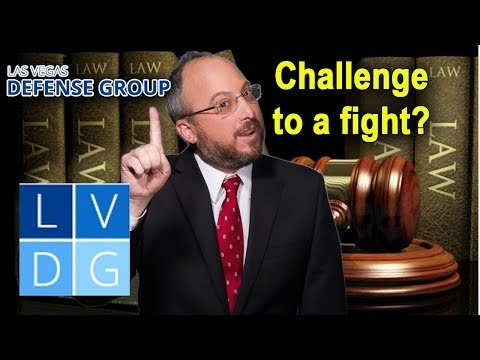
“a person, upon previous concert and agreement, fights with any other person or gives, sends or authorizes any other person to give or send a challenge verbally or in writing to fight any other person.”
A challenge to fight that involves no deadly weapons is a gross misdemeanor, carrying up to 364 days in jail and/or up to $2,000 in fines. Though if a deadly weapon is involved, violating NRS 200.450 is a category B felony, carrying:
- 1 – 6 years in Nevada State Prison, and
- up to $5,000 in fines (at the judge’s discretion)
It may be possible to get the charge dismissed or reduced to breach of peace under NRS 203.010. Possible defenses to NRS 200.450 allegations include:
- you were falsely accused;
- the police misidentified you;
- there was never an offer or agreement to engage in a fight
In this article, our Las Vegas criminal defense attorneys discuss the Nevada crime of “challenging to fight” under NRS 200.450. Click on a topic to jump to that section.
- 1. Definition
- 2. Penalties
- 3. Defenses
- 4. Sealing records
- 5. Immigration consequences
- 6. Related offenses

NRS 200.450 can be a gross misdemeanor or a felony crime depending on whether a deadly weapon is involved.
1. Definition
NRS 200.450 makes it a Nevada crime to either:
- challenge another person to a fight;
- send a message challenging another person to a fight; or
- accept a challenge to have a fight
Challenging another person to fight is still illegal even if the fight never ends up taking place. Plus the challenge can take any form, such as through talking aloud or a written message.
Example: Gregory is furious at Bill for cheating with Gregory’s girlfriend. Gregory records a menacing video challenging Bill to a gunfight at Sunset Park at midnight. Gregory then instructs his brother Jack to go to Bill’s house and play the video for Bill on Jack’s iPhone. After Jack plays the video, Bill tells Jack that he will be there. If caught, Gregory, Bill, and Jack could be convicted of violating NRS 200.450: Gregory for giving the challenge, Bill for accepting the challenge, and Jack for delivering (“sending”) the challenge.
In the above example, it makes no difference that the challenge was recorded on video: Any verbal or written challenge to fight is illegal. Nor does it matter if the fight never takes place: It is against Nevada law merely to propose a fight, agree to a fight, or send a challenge to have a fight.1
1.1. Duels
Duels are antiquated types of pre-planned fights where the participants use either a:
- rifle,
- shotgun,
- pistol,
- bowie knife,
- dirk,
- smallsword,
- backsword, or
- other dangerous weapon
Traditionally, duels are attended by the participants’ “seconds,” a doctor, and spectators.2
1.2. “Challenges to fight” versus “breaching the peace”
Breaching the peace (a.k.a. disturbing the peace or disorderly conduct) encompasses various unlawful conduct, including “challenging to fight.”3 So when police believe a challenge to fight has occurred, police must decide which crime to arrest the suspects for.
In practice, police arrest suspects for the lesser offense of breaching the peace when the “challenge to fight” is spontaneous and in the heat of the moment. If the challenge is premeditated and planned, then police are more likely to make an arrest under NRS 200.450.
2. Penalties
The punishment for violating NRS 200.450 depends on whether the fight involves the use of a deadly weapon.
If no deadly weapon is involved, a challenge to have a fight is a gross misdemeanor. The sentence is:
- up to 364 days in jail, and/or
- up to $2,000 in fines
If a deadly weapon is involved, a challenge to have a fight is a category B felony. The sentence is:
- one to six (1 – 6) years in prison, and
- up to $5,000 in fines (at the judge’s discretion)
Examples of deadly weapons include guns, knives, or any other object that can be used to cause substantial bodily harm. Fistfights are typically not considered deadly unless brass knuckles are used.
If the fight occurs and someone dies from it, the perpetrator would then faces charges for murder under NRS 200.030. It makes no difference whether or not the fight was officially a “duel.”4
2.1. Gang fight penalties
If a felony violation of NRS 200.450 involved gang activity, then the judge will add an additional penalty of one to twenty (1 – 20) years in prison. However, this sentence enhancement may be no longer than the underlying sentence.
Example: Claude is a member of the Bloods, and he receives a five-year prison sentence for making a knife-fight challenge to the Crips. Since the challenge was made in connection to gang activity, the judge may increase the sentence by up to an additional five years.
Note that a gang-enhancement sentence must run “consecutively” with the underlying sentence; this means that the sentences must run one after the other, not concurrently. Therefore, Claude in the above example would serve ten years total if the judge imposes a five-year enhancement.5
Learn more about gang sentence enhancements under NRS 193.168.
2.2. Breach of peace as a plea bargain
Breaching the peace can serve as a favorable plea bargain if you are initially charged with “challenges to fight.” Disturbing the peace is only a misdemeanor, carrying a penalty of:
- up to 6 months in jail, and/or
- up to $1,000 in fines6
A breach of peace conviction can also be sealed from your criminal record more quickly than a challenge to fight conviction (scroll down to section 4 for more information).

It is more common for police to cite people for “breach of peace” rather than “challenging to a fight.”
3. Defenses
There are various possible defense strategies to counter NRS 200.450 allegations depending on the circumstances of the case. Possible defenses include:
- you were falsely accused;
- the police misidentified you as the real perpetrator; or
- you never offered or agreed to fight (or sent a message offering or agreeing to fight)
If the fight ends up taking place, note that it is not a defense to argue that you were acting in self-defense or standing your ground. Learn more about Nevada self-defense laws.7
It is also not a defense to argue that NRS 200.450 is unconstitutional for being vague or overbroad.8
4. Sealing records
The waiting period for sealing an NRS 200.450 case from your criminal record depends on what you were ultimately convicted of:
|
Final result of “challenge to fight” case |
Waiting period to pursue a Nevada record seal |
| Category B felony conviction | 10 years after the case ends |
| Gross misdemeanor conviction | 2 years after the case ends |
| Misdemeanor conviction (if the charge is reduced to breaching the peace) | 1 year after the case ends |
| No conviction (you were acquitted at trial, or the prosecutor dismissed the charge) | No waiting period |
Category B felonies typically carry only a five-year record seal waiting period; however, it is extended to 10 years in NRS 200.450 cases because challenging someone to a fight is considered a “crime of violence.” 9
Learn more about sealing criminal records.
5. Immigration consequences
Immigration judges may find that challenging someone to a fight is a deportable offense, especially if firearms were involved.10 Therefore, non-U.S. citizens who are facing charges of violating NRS 200.450 are advised to seek legal counsel as soon as possible.
An experienced immigration and criminal defense attorney may be able to persuade the prosecutor to reduce the charges to a non-deportable offense.
6. Related offenses
6.1. Battery (NRS 200.481)
Battery under NRS 200.481 is any intentional and unlawful use of physical force on another person. Common examples include kicking, biting, punching, throwing objects act, or poisoning.
Battery can be a misdemeanor or a felony depending on the seriousness of the situation.
6.2. Assault (NRS 200.471)
Assault is intentionally placing another person in apprehension of being immediately touched in an unlawful way. In other words, assault is an attempted battery.
Like battery, assault can be a misdemeanor or a felony depending on the circumstances of the case.
6.3. Hazing (NRS 200.605)
Hazing under NRS 200.605 occurs when you impose physical brutality on an initiating or current member of a school club, such as a fraternity. Similar to challenges to fight, hazing is still illegal even if the victim agrees to be hazed.
Hazing is punished as a misdemeanor or a gross misdemeanor depending on whether the victim sustained substantial bodily harm.

When challenges to a fight come to blows, the participants face charges for assault and/or battery.
Call a Nevada criminal defense attorney…
Accused of violating NRS 200.450 in Nevada? Our Las Vegas criminal defense attorneys are available for a consultation.
We will fight to keep you out of jail and to convince the D.A. to reduce or dismiss your charges. And if the case goes to trial, we will present the best defense available in pursuit of a “not guilty” verdict.
Having a criminal record can cause people to lose out on valuable employment and educational opportunities. Therefore, you are always advised to seek advice from an attorney on how to fight your charges to keep your records clean.
Legal References
- NRS 200.450. Challenges to fight; penalties. 1. If a person, upon previous concert and agreement, fights with any other person or gives, sends or authorizes any other person to give or send a challenge verbally or in writing to fight any other person, the person giving, sending or accepting the challenge to fight any other person shall be punished: (a) If the fight does not involve the use of a deadly weapon, for a gross misdemeanor; or (b) If the fight involves the use of a deadly weapon, for a category B felony by imprisonment in the state prison for a minimum term of not less than 1 year and a maximum term of not more than 6 years, and may be further punished by a fine of not more than $5,000. 2. A person who acts for another in giving, sending, or accepting, either verbally or in writing, a challenge to fight any other person shall be punished: (a) If the fight does not involve the use of a deadly weapon, for a gross misdemeanor; or (b) If the fight involves the use of a deadly weapon, for a category B felony by imprisonment in the state prison for a minimum term of not less than 1 year and a maximum term of not more than 6 years, and may be further punished by a fine of not more than $5,000. 3. Should death ensue to a person in such a fight, or should a person die from any injuries received in such a fight, the person causing or having any agency in causing the death, either by fighting or by giving or sending for himself or herself or for any other person, or in receiving for himself or herself or for any other person, the challenge to fight, is guilty of murder in the first degree which is a category A felony and shall be punished as provided in subsection 4 of NRS 200.030.
- NRS 200.410 Death resulting from duel; penalty. If a person fights, by previous appointment or agreement, a duel with a rifle, shotgun, pistol, bowie knife, dirk, smallsword, backsword or other dangerous weapon, and in so doing kills his or her antagonist, or any person, or inflicts such a wound that the party or parties injured die thereof, each such offender is guilty of murder in the first degree, which is a category A felony, and upon conviction thereof shall be punished as provided in subsection 4 of NRS 200.030; NRS 200.430.
- NRS 203.010. Breach of peace. Every person who shall maliciously and willfully disturb the peace or quiet of any neighborhood or person or family by loud or unusual noises, or by tumultuous and offensive conduct, threatening, traducing, quarreling, challenging to fight, or fighting, shall be guilty of a misdemeanor.
- NRS 200.450; NRS 200.410.
- NRS 193.138.
- NRS 203.010.
- Wilmeth v. State, 96 Nev. 403, 610 P.2d 735 (1980)(Self-defense and “stand your ground” are not defenses to charges of NRS 200.450 when you voluntarily entered combat.).
- Pimentel v. State, 396 P.3d 759, 133 Nev. Adv. Rep. 31 (2017)(NRS 200.450 gives a person of ordinary intelligence fair notice of prohibited conduct; it is not overbroad.).
- NRS 179.245; NRS 179.255.
- See 8 U.S.C § 1227.

